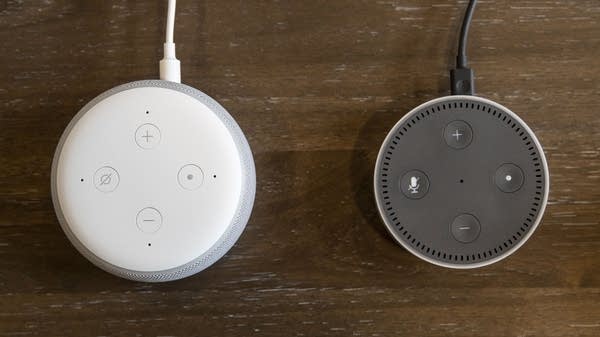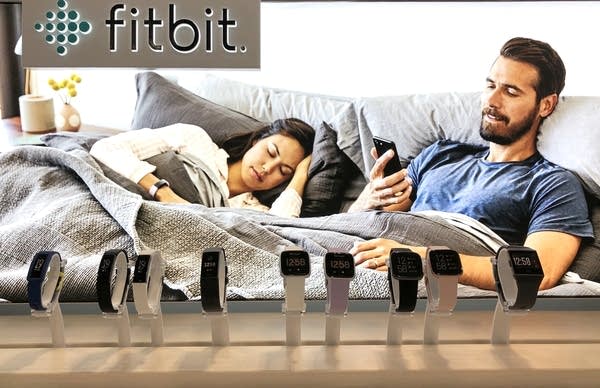Joshua McNichols of the “Primed” podcast looked into Big Tech and the big business of your smallest, most personal details.

Health data is big business. Google, of course, just announced plans to buy Fitbit for more than $2 billion. Apple is positioning its devices as the portal for medical records. And Amazon is trying to do, it seems like, everything else.
The company bought a couple of health care startups that range from prescription drug distribution to telemedicine. It setup Haven, a consulting group that wants to bring down the cost of health care.
Its Echo devices can sync with Fitbit for fitness and sleep data, and it has filed for patents on technology that would let Alexa detect when you’re sick, and it would recommend medicine. Do people want to give their medical data to Amazon? If so, is it worth it? I spoke with Joshua McNichols, co-host of a podcast about Amazon called “Primed” from KUOW in Seattle, which looked into it. The following is an edited transcript of our conversation.
Joshua McNichols: We talked to a doctor who’s looking at the Echo’s ability to detect the rate of breathing based on sending out supersonic signals like a bat or a dolphin might. They’re using this in the neonatal intensive care unit at the University of Washington to detect how babies are breathing by setting an Echo outside their crib, for example. We’ve also seen them training Alexa to recognize what’s called agonal breathing, which is a breathing associated with heart attacks, for example, so that they might be able to detect a heart attack before it’s happening.
Molly Wood: This raises the obvious question, though, like how big of a hurdle would that be for consumers to say, “Yeah, just be on all the time listening for me to have a heart attack — and everything else?”
McNichols: There is a really strong tension there between the Echo’s potential use as a medical device and Amazon’s desire to lock it down so that it can’t be vulnerable to being hacked. When you look at smartphones, an app can just take over all parts of the smartphone. Amazon makes it much harder to take over the actual internal mechanics of the Echo. At some point, Amazon is going to have to decide: Do we want to open this device up so that it can serve consumers in this way that researchers are exploring, or do we want to keep it locked down and maybe look at getting some of that personal health data from other sources, such as through wearables, like the earbuds that they’re developing or the glasses that they’re developing?
Wood: What do you think the health landscape starts to look like as you get Amazon, Google, Apple, these fairly nontraditional sources of health-related information? Could it hamper Amazon’s efforts if it can’t control the entire ecosystem? What do you think this competitive landscape starts to look like?
McNichols: Amazon is at a bit of a disadvantage, because you’ve got Google and Apple [who] already have smartphones, but Amazon doesn’t have a phone. So it’s really having to rely on getting Alexa into more and more devices. This idea of Alexa everywhere is really important to Amazon, because the more they can get Alexa in different wearables, the more they can start to collect the kind of information that other companies like Apple and Google already have a bead on.
Wood: You talked about how doctors and research do seem to see real potential, real health benefits in this data, but that one of them referred to the idea of having too much information about your fitness or your breathing or sleeping, so much so that it turns you into “the worried well.” Tell me about this idea of the data overload and how useful it could really be.
McNichols: This is something really interesting to me, because these devices have incredible power to track our lives and our health and our fitness in granular detail. When you just see the raw data, we don’t necessarily know how to interpret that as patients — we’re not very good doctors for ourselves. One thing that becomes really important is: Is there a plan for there to be some kind of interpretation of this data that will help us turn all that overwhelming raw data into useful ways to live our lives? That’s one thing that Amazon seems to be positioning itself to do, because Alexa, when you think about it, has some of the same qualities as a doctor. Amazon is investing in technology that could help give Alexa a broader understanding that would enable it to not just be answering stupid trivia questions or calling up a song for us, but could help us sift through Excel spreadsheets with all kinds of information about our heart rates, when we’re getting exercise and how we’re sleeping — sifting through that and coming up with specific recommendations as to how we might change our lifestyle.
Wood: What you’re describing sounds like it would create massive liability, though. That is a very specific medical role, in some ways, that you’re describing. Do you have a sense of whether this is going to trigger some regulatory response?
McNichols: The first stages of this that we see suggests that Alexa would actually be still complementing a doctor, not replacing a doctor. The technology that we’ve seen in use by NASA, for example, to help Mission Control understand what its astronauts are doing and how they should be focusing on this task or that task because they’re running out of oxygen — Mission Control surgeons are still making the final decisions. If the connection is lost, for example, this intelligent agent can help the astronauts stick to the plan that the doctor set out, even though they may have lost communication for a little bit.
Wood: How early do you think this is? I think we’ve heard a lot about the promise of artificial intelligence in terms of predictive capabilities in lots of different areas, specifically medicine. Is this the kind of technology that is actually currently being used by medical professionals, not necessarily from Amazon, but from other places? And do you think that there really is proof that it works?
McNichols: Well, in terms of whether it’s used, right now, there’s just a small handful of skills on Alexa that are truly for the health care industry, and they tend to focus on some basic things like scheduling doctor’s appointments, for example. When you look at health fitness trackers, for example, most of them now have premium versions of their service, where there is something like an intelligent agent that helps keep you on track with your fitness goals. That’s actually already happening, and it’s not too much of a stretch to imagine how that could then be expanded a little bit to take more health data into account than just what your workout is. We think it’s a small hop from the fitness tracking that’s happening now to something that takes into account more health data.

Joshua McNichols mentioned that Alexa devices have a few skills related to medical data. Six of those skills were launched back in April, with some of them being able to check on prescription deliveries from Express Scripts, manage employee wellness perks from Cigna and schedule same-day urgent care appointments with a company called Atrium Health.
Amazon pledges that all of these skills are compliant with HIPAA, the federal medical information privacy law, so if you use an Echo device to ask for post-surgery updates from Boston Children’s Hospital, that data should be securely transmitted.
In other health moves, just last month Amazon bought a startup called Health Navigator, which lets people enter their health symptoms online and hopefully get routed to the right kind of care. Over at CNBC, Christina Farr reports that Amazon will offer Health Navigator’s services to its employees as part of its benefit package that also includes Amazon Care, which is basically a virtual medical clinic.
The company made a different kind of news in September around health care when it announced it would get rid of health benefits for about 1,900 Whole Foods workers who worked 20 hours a week or fewer. Maybe it could expand Amazon Care to cover those people virtually, at least.